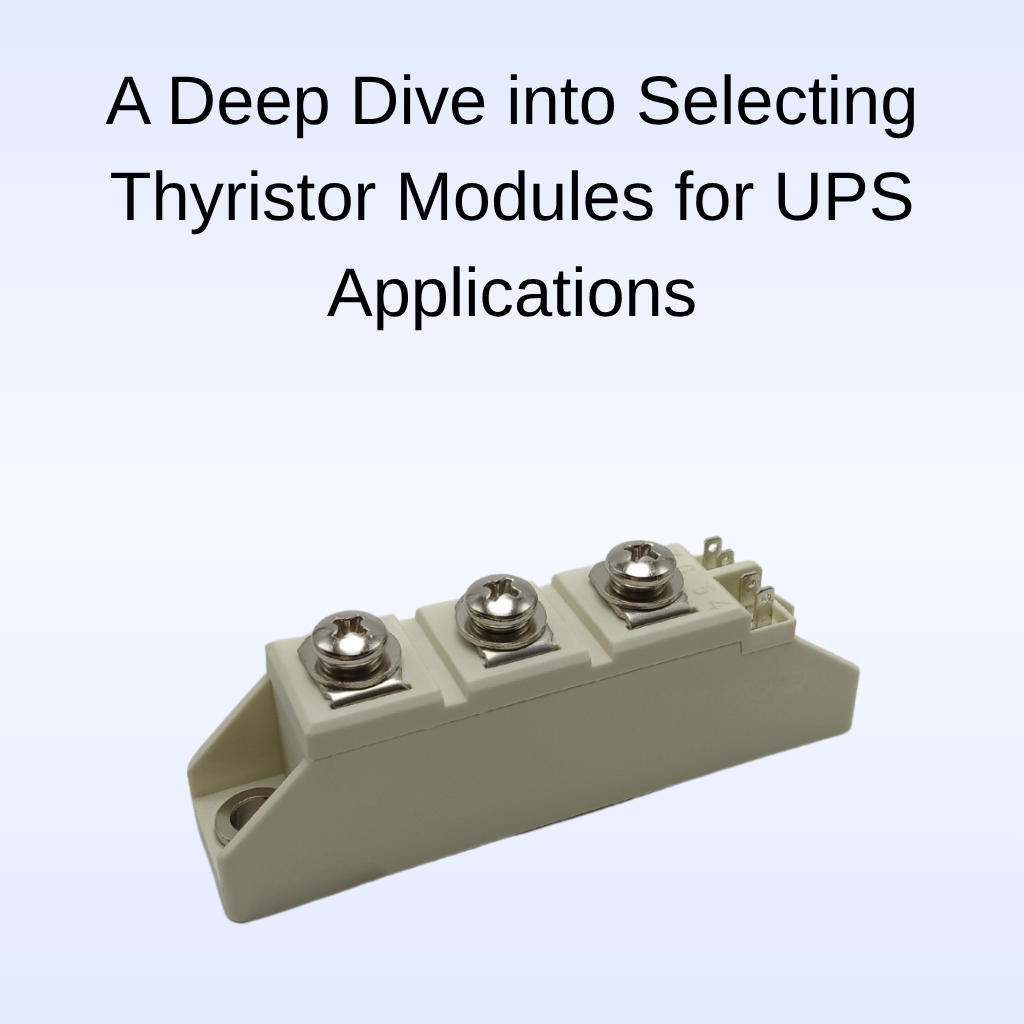A Deep Dive into Selecting Thyristor Modules for UPS Applications
Choosing the right thyristor modules is a crucial step in ensuring the proper functioning of Uninterruptible Power Supplies (UPS). Thyristor modules are responsible for regulating the power flow in UPS systems and protecting sensitive equipment from electrical surges. This article provides an in-depth look at the factors to consider when selecting thyristor modules, focusing on performance features that directly impact UPS efficiency and reliability.
Why Thyristor Modules Matter in UPS Systems
Thyristor modules are integral components of UPS systems, as they control the switching process between DC and AC power. Their role is to ensure stable and reliable power delivery even in fluctuating conditions. Choosing the right thyristor module involves understanding various performance metrics such as high surge current, low on-state voltage, and industrial phase control, all of which contribute to the smooth operation of the UPS.
High surge current handling is essential because UPS systems are often subjected to transient conditions, including voltage spikes or inrush currents when devices are switched on. A thyristor module capable of managing these high surge currents will protect the UPS system and connected equipment from damage.
Key Features to Consider in Thyristor Modules
1. High Surge Current Resistance
UPS systems require thyristor modules that can withstand high surge current to ensure that they can cope with sudden power demands. Whether it's a power surge during start-up or a spike in current when switching loads, modules designed with high surge current resistance will prevent failures and ensure the UPS system operates smoothly under pressure.
2. Low On-State Voltage
A key consideration when selecting thyristor modules is their low on-state voltage. A lower on-state voltage leads to fewer power losses, which in turn improves the overall efficiency of the UPS system. This is particularly important for systems that run continuously, as even small energy savings can accumulate over time, leading to significant cost reductions.
3. Industrial Phase Control
Industrial phase control is another important feature for industrial-grade UPS applications. Thyristor modules equipped with phase control can deliver precise AC power, ensuring that equipment receives the correct voltage regardless of changes in load or power conditions. This feature is crucial in industrial settings, where power quality directly impacts the performance of machinery and equipment.
4. Dual Thyristor Module Design
A dual thyristor module design combines two thyristor components into a single unit, improving system reliability and durability. This configuration is beneficial for applications requiring high performance and redundancy. It minimizes the risk of failure, ensuring the system can continue to function even during challenging conditions.
How to Choose the Right Thyristor Module for Your UPS
When selecting thyristor modules for UPS systems, focus on modules that offer a combination of high surge current handling, low on-state voltage, and industrial phase control. Additionally, consider dual thyristor modules for added reliability. The right selection ensures that your UPS system can operate efficiently, minimize downtime, and extend the life of both the UPS and the connected equipment.
By carefully considering these features, you can ensure that your UPS system remains effective and reliable, providing uninterrupted power to sensitive equipment and minimizing the risks of power disruptions.
READ MORE:
Key Considerations When Selecting Thyristor Modules for UPS Systems
How to Choose the Right Thyristor Modules for UPS Applications: A Comprehensive Guide
How to Choose the Right Thyristor Modules for UPS Applications
Smart Thyristor Modules for UPS Prognostics and Load Shaping
Thyristor Modules in UPS: Fault Isolation and Ride-Through Support
Thyristor Modules for UPS Diagnostics, Bypass and Load Control
Mission-Critical and Specialty Use Cases of Thyristor Modules

